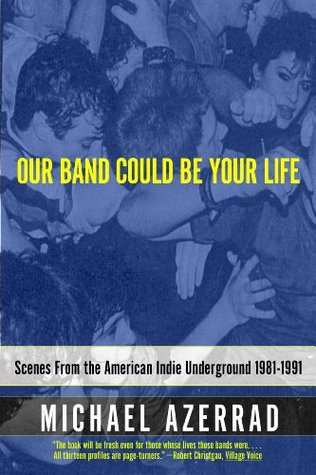More on this book
Community
Kindle Notes & Highlights
Boston Rock interviewer Gerard Cosloy asked why they didn’t try to stop violence at their shows. Dukowski responded with a succinct summation of the punk principle of anarchy. “Do we have a right to act as leaders, to tell people how to act?” Dukowski replied. “The easy solution isn’t a solution, it’s the fucking problem. It’s too easy to have someone tell you what to do. It is harder to make your own decision. We put a certain amount of trust into the people that come to see us.”
Rollins’s tour memoir Get in the Van,
This was a band whose stage presence one fanzine admiringly described as “comparable to an epileptic boy scout molesting a bag lady” and possessing “all the humor of a muscular dystrophy telethon.”
And yet in Rollins’s own estimation, the band was playing the best it ever had, and the proof is on the live Who’s Got the 10½? recorded at the Starry Night club in Portland on August 23, 1985. Although Rollins’s voice is clearly in shreds, the band goes at the material like trained attack dogs.
Pure Joy,” for instance, is about how capitalism depends on the nuclear family and, ultimately, on everyone’s sense of their own mortality.
In the best sense of the word, the Minutemen were conservative, a time-honored concept in American thought going back at least to Thoreau. “Econo is an old concept,” Watt agrees. “The punk rockers picked up on that, the idea of scarcity and just using what you got. And maybe more of you comes through because there’s less outside stuff you’re sticking on—all you got is you, so you have to make something out of it.”
said MacKaye in the essential 1983 hardcore documentary Another State of Mind.
Hüsker Dü proudly stuck up for classic rock. “You know the whole deal with tearing down the old to make room for the new?” Hart said. “Well, music isn’t city planning.”
PEOPLE ARE LIVING IN THINGS THAT HAVE HAPPENED, THE 60’S HAVE HAPPENED, YOUR PARENTS HAVE TAKEN ALL THE DRUGS THEY CAN TAKE, YOU’VE HAD THE 70’S, YOU HAD HEAVY METAL—GET WITH IT, IT’S OVER WITH, WAKE UP. KIDS ARE LIVING RE-RUNS, THE SAME CRAP OVER AND OVER AND THEIR MINDS GET CLOSED TIGHTER AND TIGHTER, IT’S SUCH A WASTE. THE SAME POLITICAL CRAP, THE RADIO IS DEAD. I THINK THE WHOLE THING IS GONNA FALL DOWN TO THIS LOWER LEVEL, CAUSE I KNOW KIDS ARE GETTING INTO IT, THEY DON’T HAVE ANYTHING ELSE. WHAT WE HAVE AT THESE SHOWS, AND WITH THESE RECORDS—THIS IS OUR BATTLEFIELD, THIS IS WHERE WE’LL
...more
Back in the hardcore days, MacKaye and his friends were mad about the things all teenagers are mad about. And they lashed out at the first thing they saw, which was the forces oppressing them from within and without their immediate social circle. But as they got older, their perspective naturally broadened, and by 1985 Dischord had started donating modest amounts of money to progressive organizations such as Handgun Control, Planned Parenthood, the Union of Concerned Scientists, and the American Civil Liberties Union, as well as local homeless shelters, homes for battered women, soup kitchens,
...more
“The power of ‘No,’ man, that’s the biggest bat we’ve ever wielded,” says Picciotto. “If it makes you uncomfortable, just fuckin’ say no. It’s made life so much easier for us, man. I think bands are fragile, particularly our band—we’re super fragile, we’re control freaks—if things upset us, we can’t deliver…. That’s what it’s about—all this shit, just setting it up so we can go out and play without cares, man. It eliminates everything. It just slashes through all that crap.”
People in concert crowds were not used to being noticed and singled out by a band—it was as if the television set had started talking back to them. “It’s almost like some kind of code has been violated that really makes people feel weird,” says Picciotto. “And I’m into that. I’m into that kind of weirdness. Really, the ultimate concept is we are human beings just the same as anyone else. If we see something on the street that we think is fucked up, we would testify about it. If we see something going on in the room, just because we’re the jukebox doesn’t mean that we give up our power of
...more
But the band was still a bit nervous about performing, and Arm and Turner would work off the tension by cutting up onstage—tossing their guitars to each other across the stage midsong, striking silly ballet poses, making absurd between-song banter, or just rolling on the floor—then launch right into another dark and fuzzy musical psychodrama.
If you want to sell records in England, you want to sell them something American, you don’t want to sell them something that sounds British,” Pavitt says. “And these guys seemed very authentic and that’s what appealed to me about the group.”


